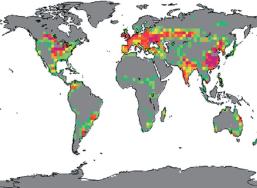
Andy Ridgewell
Climate modelling work already carried out in Bristol suggests that wide spread cultivation of crops with more reflective leaves could result in significant decreases in summertime air temperatures in Europe.
Work currently in progress is measuring leaf albedo (surface reflectivity) in a wide range of barley cultivars. We will then use these values to assess the cooling that would be achived by the widespread planting of the cultivars with the highest albedos.
Our work so far has been carried out on young plants grown in greenhouses - we need to make measurements of albedo in the field to assess the affect on temperature of growing these plants throughout a growth season.
 In order to breed new varieties with greater albedo we need to understand which features of the leaf surface are important in controlling albedo.
In order to breed new varieties with greater albedo we need to understand which features of the leaf surface are important in controlling albedo.
We also need to investigate whether we can alter other leaf properties to help mitigate the effects of climate change - a key question is to investigate whether we can increase the hydrophobicity of crop leaves such that more rainwater flows from the leaf surface to the soil rather than entering the atmosphere through evaporation.
Finally, we need to employ and improve models of vegetation and crop cycles to understand how leaf properties determines the overall fraction of solar energy absorbed rather than reflected back to space and whether crop yield might be impacted.
Read the paper Tackling Regional Climate Change By Leaf Albedo Bio-geoengineering - Ridgwell et al., Tackling Regional Climate Change By Leaf Albedo Bio-geoengineering, Current Biology (2009), doi:10.1016/j.cub.2008.12.025 .